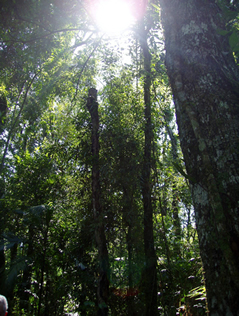Buenos Aires: Forget forests at your peril - IUCN
19.10.09
Economic development and forest loss and degradation do not have to go hand in hand, according to IUCN.
In the opening speech to the World Forestry Congress in Buenos Aires, Argentina, IUCN Deputy Director General Dr. William Jackson said given the rate at which climate change is happening, no country, rich or poor, could afford to neglect its forests.
 “The world is currently struggling with the long-term challenges that climate change will have on economic growth, but also how we can realistically stabilise green-house gasses within one decade,” said Dr. Jackson. “There is a growing realisation that forests are one of the few technologies that are immediately available and relatively cost effective when it comes to mitigating climate change. If we manage forests sustainably we can bridge the gap while other technologies are being developed for reducing emissions.”
“The world is currently struggling with the long-term challenges that climate change will have on economic growth, but also how we can realistically stabilise green-house gasses within one decade,” said Dr. Jackson. “There is a growing realisation that forests are one of the few technologies that are immediately available and relatively cost effective when it comes to mitigating climate change. If we manage forests sustainably we can bridge the gap while other technologies are being developed for reducing emissions.”
The continued decline in forest area and quality, particularly in the tropics, has serious social, economic and ecological consequences. The decline has grave implications for the wellbeing of millions of people dependent on forests, but the rural poor are often those least well-equipped to take part in negotiations.
Closely associated with the right to a place at the negotiating table, is the right to access forest lands, and to use and trade forest products and services. Whatever the agenda for forests, it has to be one that makes sense to the two billion people who live on less than US$2 a day – many of whom depend on forests for their livelihoods.
Connecting the poor to markets that can reward them for forest conservation by generating real income gains is fundamental to managing forests sustainably. Properly-managed forest landscapes can provide a wide range of ecosystem services that support sustainable livelihoods, conserve biodiversity and enhance resilience to climate change.
But in many places deforestation and forest degradation have reduced the ability of the landscape to provide a broad range of ecosystem services, and threatened livelihoods and biodiversity. Forest Landscape Restoration provides an innovative approach to building resilience by restoring forests.
“Climate change has catapulted forests on to the international agenda after years of languishing in the dusty corridors of UN meetings,” said Dr. Jackson. “We must seize this moment to promote the sustainable management of forests and to develop sustainable livelihoods for the people who depend on forests.”
The full speech is available here.
IUCN spokespeople at the World Forestry Congress in Buenos Aires, Argentina:
- Dr William Jackson, IUCN Deputy Director General, wjj@iucn.org
- Stewart Maginnis, Director of IUCN’s Environment and Development Group, stewart.maginnis@iucn.org
If you read this you might enjoy these too:
The future of the planet depends on its forests
01.10.09
As Copenhagen - and a promised new climate deal – rushes towards us a rallying cry has been issued by The Forests Dialogue (TFD) who say “conservation of world’s forests key to planet’s survival.”
30.09.09
 Daniel Beltra's award winning photographs from the Amazon, Congo, and Indonesia show us the beauty and fragility of the world's rainforests.
Daniel Beltra's award winning photographs from the Amazon, Congo, and Indonesia show us the beauty and fragility of the world's rainforests.
Peru: One million acres of Amazon saved
01.09.09
 The World Land Trust-US (WLT-US) and their local partner CEDIA (Center for the Development of the Indigenous Amazonians) announced on the 27th August 2009 that the Matsés National Reserve was approved by the Peruvian government.
The World Land Trust-US (WLT-US) and their local partner CEDIA (Center for the Development of the Indigenous Amazonians) announced on the 27th August 2009 that the Matsés National Reserve was approved by the Peruvian government.
27.07.09
 It’s time we brush up on REDD - or Reduced Emissions from Deforestation and Degradation – for all our sakes.
It’s time we brush up on REDD - or Reduced Emissions from Deforestation and Degradation – for all our sakes.
In 2012 the Kyoto Protocol to prevent anthropogenic climate change runs out. 2012 is a significant year for many other reasons too. For instance, if you’re an ultra pessimist you may think the end is nigh - if the Mayans and their calendars are correct. If you’re a new age optimist you might believe there will be a strong shift in social consciousness - perhaps saving ourselves from our own behaviour.